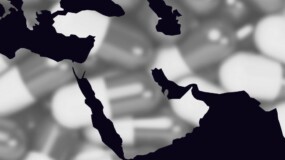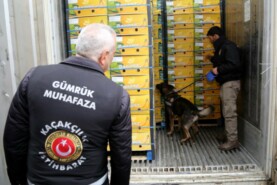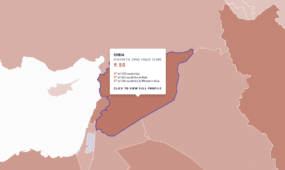Posted on 17 Nov 2023
With Syria’s return to the Arab League, curbing the Captagon trade has risen to the top of the region’s political agenda. Syria must now navigate how to meet its counter-narcotics commitments while maintaining its profitable status quo.
On 19 May 2023, Syrian President Bashar al-Assad made a controversial return to the international stage by appearing at the Arab League summit in Jeddah, Saudi Arabia, after more than a decade of political and economic isolation from his neighbours. Syria’s reintegration into the organization can be considered part of the region’s efforts to combat the ever-growing Captagon trade, in which Syria plays a pivotal role as the world’s leading producer.
Captagon production in Syria has escalated in scale and is now made primarily in industrial-scale facilities in areas under the control of the Syrian regime, providing it with a crucial financial lifeline amid the country’s costly and protracted civil war. The illicit trade has reached an all-time high, with an estimated market value of more than US$5.7 billion per year. This highly addictive amphetamine has flooded Western Asia’s streets and is now favoured by drug users across the full spectrum of society, from affluent youth in the Gulf to blue-collar workers in countries such as Iraq and Jordan, where the drug can often be bought for as little as a few dollars per pill.
The expansion of this drug market has left Syria’s neighbours – namely Jordan, Lebanon and Iraq – grappling with an unprecedented influx of Captagon. These countries have in the past been transit points for Captagon en route to the Gulf, and Saudi Arabia in particular, the most lucrative consumer market for the drug. In recent years, however, there has been reportedly increasing domestic usage in these countries, leading to rising tensions with Syria, whom they deem to be the cause of the problem.
The security situation along the Syrian–Jordanian border is particularly tense, with frequent violent clashes between Syrian drug smugglers and the Jordanian army resembling a de-facto drug war. In response to the innovative smuggling techniques used by Syrian Captagon traffickers, including the use of drones, Jordan’s controversial shoot-to-kill policy directly resulted in the deaths of 27 Syrian traffickers in early 2022.
A dubious pledge
Arab leaders have given Syria a condition: if it wants to be readmitted to their club, the Arab League, the country needs to curb its Captagon trade. In his opening speech at the summit, Assad promised his Arab counterparts that Damascus would intensify its efforts to combat drug trafficking and ‘identify all groups involved in the trade’, while committing to put an end to the Captagon trade plaguing the region.
Despite Syria’s pledge, the summit failed to address widespread accusations that Syria itself is the main beneficiary of the drug trade, which is believed to fund its state budget and war economy amid a decade of conflict and sanctions. Although Damascus has always denied any involvement, several influential members of the Assad family have been targeted by Western sanctions for this reason, including Maher al-Assad, the president’s younger brother and commander of the army’s infamous Fourth Division.
Nevertheless, to incentivize it to deliver on its promise, Arab leaders are offering Syria the carrot that they will resume diplomatic and economic relations – a valuable prospect for the world’s third most sanctioned country – if it gets its Captagon trade under control. The Gulf states, led by Saudi Arabia, have pledged to support the country’s economic recovery with a US$4 billion financial aid package as part of a broader diplomatic effort to promote regional stability.
The pressure is high for Syria to take up on the offer. The country’s once-thriving formal economy has been devastated by war and Western sanctions, and ultimately even revenues from the drug trade pale in comparison to the country’s financial losses. Syrian Foreign Minister Faisal Mekdad seemed to acknowledge this when he told his Arab counterparts earlier this year that Syria’s efforts to curb the Captagon trade depended heavily on Arab diplomatic pressure on the United States to ease sanctions.
Nevertheless, the Syrian regime is unlikely to want to give up the lucrative Captagon trade any time soon. Instead, it is likely to face a balancing act – appeasing its neighbours and rebuilding crucial diplomatic ties and trade relationships, while diverting attention away from Syria’s direct involvement in the trade and reaping the profits.
Diversion efforts
One way Assad may attempt to conceal Syria’s involvement is to redirect the Captagon supply chain elsewhere. With Arab leaders primarily concerned about the drug’s impact on their own countries, Syrian criminal groups could exploit links with actors with extra-regional reach, including Iranian or Iranian-backed groups such as Hezbollah. The Lebanese group has not only emerged as a secondary producer of the drug, but also has well-established criminal links as far afield as Latin America and West Africa, where it is already involved in the cocaine industry.
Redirecting Captagon flows beyond Western Asia is a viable prospect in the eyes of the Syrian regime. Various countries in Europe, Africa and the rest of Asia are already witnessing the drug’s growing presence. Notably, Europe has now become a transit point for Syrian-produced Captagon destined for consumers in the Gulf, as evidenced by the growing number of interceptions in countries such as Austria, France and Italy. Moreover, there is increasing concern that production activity is shifting to the continent, with authorities in the Netherlands (already a world leader in synthetic drug production) and neighbouring Germany reporting that they have uncovered Captagon production laboratories. With increased transit and production activity in Europe, it may only be a matter of time before consumer markets develop.
As the drug continues to spread into markets beyond Western Asia, within Syrian territory the coming years may see an increase in publicly announced arrests and seizures, to show evidence of Damascus’s counter-narcotics efforts.
However, Syria’s potential shifting of the Captagon trade away from the region may not be enough to reduce the drug’s impact on its Arab League neighbours. Western Asia’s large and diverse consumer market means that new players may enter the scene to capitalize on the growing regional demand. Captagon is notorious for being easy and inexpensive to produce in makeshift laboratories, with readily available precursors and basic equipment, raising concerns about its further spread across the region – with or without Syrian criminal groups.
In Lebanon, for example, Hezbollah is believed to be engaged in Captagon production and trafficking independently of Syrian groups. Similarly, the first Captagon production laboratory in Iraq was discovered near the Saudi border in July 2023, while militias under the umbrella of the Iranian Popular Mobilization Forces are also reported to be entering the market.
Syria’s return from diplomatic isolation is shaking the region’s geopolitical ground and only time will tell how this development will influence future regional cooperation in combating the Captagon trade. However, regardless of the efforts of Syria and its Arab counterparts, as long as the broader Arab region fails to address its myriad of other challenges – such as the proliferation of criminal groups and threats to territorial integrity – it is likely that the lucrative Captagon trade is here to stay.
This analysis is part of the GI-TOC’s series of articles unpacking the role of drugs in organized crime in Western Asia. The series explores, from a regional perspective, how drug trafficking is influenced by instability and broader geopolitics, the effects it has on local dynamics throughout illicit supply chains and its wider global impact. Sign up to our Western Asia mailing list.



